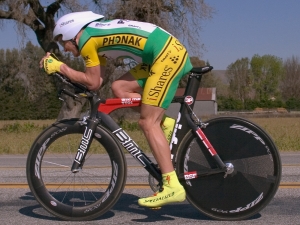Athletes, Health and Anti-Doping
Research news
Deakin University is hosting a public seminar looking at that most vexed of issues - athletes, health and anti-doping.
Moderated by barrister Colin Golvan, the seminar features a rich array of local and international speakers covering a wise range of subjects, including:
Christophe Brissoneau (National Center of Scientific Research – University Paris Descartes, Paris, France)
Christophe is a researcher in CERSES (Research Center “Sense, Ethics and Society”), at the University Paris Descartes-CNRS. He directed the project “Doping in Professional Sport in Europe” for the European Parliament and has recently conducted a research project on doping in cycling for WADA. His research interests include the ambivalence of sport medicine and doping careers.
Doping careers in France between US and Eastern Bloc influences.
In the 60s, French president De Gaulle decided to create an elite sport policy on the model of East Germany (sport structures, new research medicine, training methods). In the middle of 80s, elite sport developed again with an opening to the private enterprises. This new management had as its result an increase in both performances and of pains and injury. The consequences has been a normalization of pharmacology (both legal and illegal) in high level sport.
Trent Lowe(born 8 October 1984 in Melbourne) rode for Garmin-Transitions on the UCI ProTour from 2008 to 2010. The former full-time professional mountain biker had a breakthrough year on the road in 2005 riding for the US domestic team, Jittery Joe’s, where he caught eye of Discovery Channel sports manager Johan Bruyneel. He was signed for Discovery Channel for his superior climbing abilities. In 2002 he won the UCI MTB World Junior XC Championship, then he won the under-23 Australian National Mountain Bike Championship in 2003 and 2004. Following two seasons of injury and chronic fatigue, the young climber signed with the new Australian team, Pegasus, before the announcement that they has failed to obtain an 2011 UCI World Tour license.
Cyclists, work health and life.
Trent will speak about his experiences as a professional cyclist and the issues he feels athletes face, including their relationships with and the expectations of the teams that hire them. His talk will address issues he encountered in trying to stay healthy and the measures he took to regain his health. His concerns raise the issues of the limited options available to athletes, the challenges that he feels cycling is faced with, and the need for riders to be given more respect within their workplace.
Matthew Dunn (Deakin University School of Health and Social Development)
Dr Matthew Dunn is a Lecturer at Deakin University and a Visiting Fellow at the National Drug and Alcohol Research Centre, UNSW. He has an extensive research background in the field of public health, with a strong focus on the use of licit and illicit substance use among elite sporting populations. He also conducts education and training seminars with many elite sporting groups.
Athlete well being and anti-doping: Why is it always about EPO?
Much focus is given to developing newer and better tests to detect the newer and better substances that athletes may use to increase their performance. Anti-doping efforts are conducted, in part, to protect the health and well being of the athlete. Yet most athletes will not come into contact with these ‘designer’ substances; the biggest threat to their health and well being is the use of licit substances such as alcohol and illicit substances such as cocaine. This presentation will discuss substance use in sport and what is being done to safeguard athletes’ well being.
Jason Mazanov (School of Business, UNSW)
Dr Jason Mazanov, a Senior Lecturer with UNSW, research focus looks at how social science can inform the management of drugs in sport. He is editor of the book “Towards a Social Science of Drugs in Sport”. Dr Mazanov is currently working on how managing doping in society (e.g. brain doping by university students) can inform the second generation of policies governing drugs in sport.
Building the Second Generation of Policies to Manage Drugs in Sport
The wisdom learned through the anti-doping policy experiment provides a platform for developing a second generation of policies to manage the role of drugs in sport. For example, the anti-doping policy focus on legalistic “detect and punish” prioritises the integrity of sport above that of athlete welfare. This policy provides little scope for evidence-based, best practice drug treatment or the difference between doping and licit (e.g. alcohol) and illicit (e.g. ecstasy) drug use. Alternative policy paradigms (and their implications) are offered with different foci, including health-based harm minimisation, muscular Christianity, and returning “fun and joy” to be the central value of sport.
Martin Hardie (Deakin University School of Law)
Martin Hardie teaches law at Deakin University and has worked extensively in the world of professional cycling both as a journalist and academic researcher. He was the lead author of the I Wish I was Twenty One Now Report, the organiser of the New Cycling Pathways conference in Geelong 2010 and has recently published an extensive examination of Operacion Puerto in the book Doping and Ant-Doping Policy in Sport Ethical, Legal and Social Perspectives.
Cyclists, Anti-Doping and Medical Monitoring – a better approach?
This presentation will focus upon the merging of the Athlete’s Biological Passport with athlete health programs as a means to both develop athlete concordance with anti-doping policy and as a mechanism to achieve effective rather than simply rhetorical health management in professional cycling.
When: Monday 25 July 2011
Time: 6 – 9 pm
Where: Deakin University Melbourne City Centre, Level 3, 550 Bourke Street, Melbourne (the Deloitte Building)
For further information, contact Martin Hardie.
martin.hardie@deakin.edu.au
Share this story

